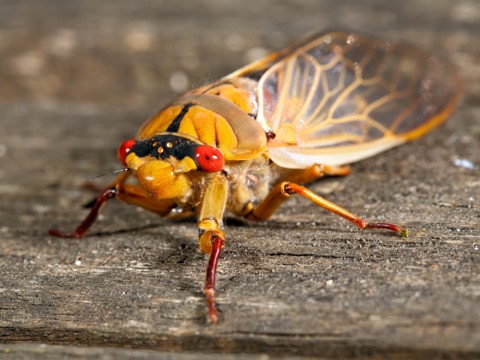Cicadas are ever-present in Tennessee summers. Residents hear them “singing” — or buzzing — all day and night, so they’re presence should not come as a shock. But this year, the U.S. is due for the next cicada swarm, known as Brood X. This 17-year cicada swarm is coming in 2021 to parts of the Mid-Atlantic and Southeast, but will the cicada Brood X be coming to Nashville, Tennessee?
Where are the cicadas going to be this year?
Brood X, the cicada swarm emerging in 2021, typically impacts the New Jersey coast to parts of Illinois, and from Michigan south to Georgia. That cicada Brood X map includes Tennessee. This year is likely to be similar, but there is a big chance that the majority of Nashville will be spared.
In 2004, when the cicada Brood X last came above ground, middle Tennessee and Nashville were hit hard. This year, however, looks different. According to experts, urban development may impede the movement of 2021 cicadas, making it more difficult to emerge from underground. The Brood X periodical cicadas will probably remain in the eastern counties of Tennessee.

When is the next cicada year for Nashville, TN?
Cicada Brood X is not expected to have a large impact on the Nashville area, but in 2024, the next cicada swarm will likely hit Nashville.
How big are the Brood X cicadas?
Brood X is a group of cicadas that emerges every 17 years — which means they were most recently active in 2004. They’ve been living off tree sap underground for nearly two decades. So, how big is Broox X? There are millions of cicadas in the brood, and it is the largest brood of them all.
The brood X cicadas of 2021, however, are not expected to be as big as year’s past because of cooler spring temperatures. Cicadas emerge when the ground temperatures reach 64 degrees Fahrenheit. After emerging, their end goal is to make it to treetops in order to mate, lay eggs, and die. Still, there expected to be about 1.5 million periodical cicadas per acre.
When will Brood X emerge
As of mid-May, some of the Brood X have already emerged along the East Coast. They are expected to hit eastern Tennessee in May and early June. After they emerge, it takes about five days for the cicadas to begin making sound and mating. Their buzzing will last for about six weeks, which is about how long the cicada life cycle is.
Is the 2021 Cicada Brood X dangerous?
Cicadas do not bite or sting, so you don’t have anything to worry about there. They do, however, know how to make a ruckus. When looking for a mate, cicadas vibrate and emit a unique sound that Tennessee residents know all too well.
In fact, they are the loudest insect on earth.
During the emergence of cicadas , all of those males are looking for a mate at once, which can result in loud “singing.” Experts predict that the sound of the cicadas will reach between 80 and 100 decibels, which is about the same amount of decibels as jet airplanes flying over your head.
How to get rid of cicadas in your Tennessee home
Even though cicadas aren’t harmful to your family or pets, you may not want the noise in your backyard. Plus, their carcasses can cause an unsightly mess. Here are some simple tips to get rid of cicadas in your Nashville area home.
- Spray water on them to knock them off trees or the side of the home.
- Place foil barrier tape around the trunks of trees to keep them from climbing up the trunk and settling in
- Wrap trees in fine netting
- Call your local pest control company to apply insecticide around your home, paying special attention to window and door frames and any other openings.
- Regularly prune and trim trees to decrease the amount of space cicadas can hide
If you remove cicadas from trees, the side of your home, or anywhere else in your yard, take special care to clean up and remove their carcasses. Their exoskeletons can add up quickly — especially during a brood year.
You can always call your local pest experts at Thrive Pest Control for help preventing and removing cicadas from your home or business. Give Thrive a call today to schedule an inspection and begin the process of living pest-free.
